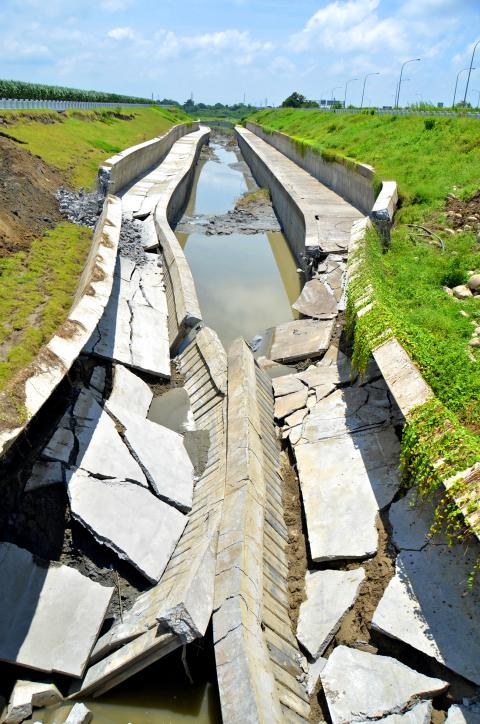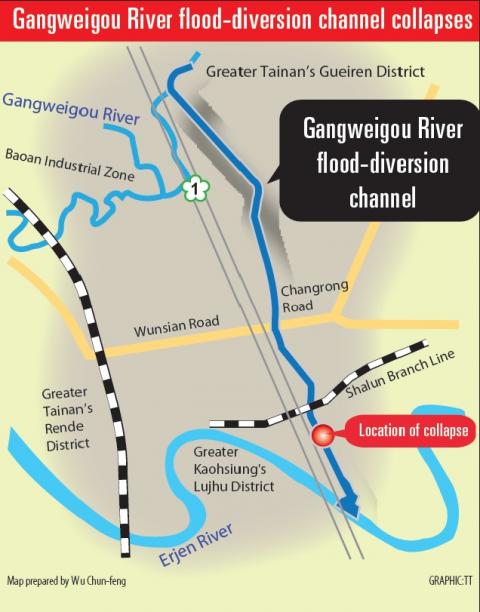A 170m stretch of the Gangweigou River (港尾溝溪) flood-diversion channel in Greater Tainan collapsed in the early hours of Friday after torrential rains that hit the south on Tuesday, prompting concerns over the sturdiness of the structure, which had been inaugurated three weeks ago.
The Gangweigou diversion channel, constructed by the Ministry of Economic Affairs’ Water Resources Agency, spans 3.8km and cost about NT$1.5 billion (US$49.9 million). The project was launched in March 2012 and was only recently completed, with an inauguration ceremony held on July 26 this year.
The Water Resources Agency’s Sixth River Management Office yesterday said it would complete emergency repair tasks in the ruptured area before Wednesday.

Photo: Wu Chun-feng, Taipei Times
Sixth River Management Office director Tsai Tsung-hsien (蔡宗憲) said the Gangweigou diversion channel was designed to withstand 175 tonnes of water per second, as seen in once-a-generation events. However, the rainwater in the channel on Tuesday flowed as rapidly as 250 tonnes per second, resulting in structural damage, he said.
Unconvinced, Greater Tainan City Councilor Wang Ting-yu (王定宇) of the Democratic Progressive Party said the flood-diversion channel was “the most expensive ‘tofu-dreg’ project in history,” adding that it could endanger the nearby National Sun Yat-sen Freeway (Freeway No. 1).
He also called into question the soundness of the construction materials used in the channel, alleging that contractors may have cut corners during construction and demanding that authorities investigate.

Tsai responded to Wang’s suspicions by saying that the flood-diversion channel was built of concrete sheet piles, which are bound together by a cap beam.
He also denied that the facility would pose a threat to the nearby freeway, saying there is about 10m of space between the two.
Meanwhile, Greater Tainan Mayor William Lai (賴清德) interceded for the Water Resources Agency, saying the channel served its purpose because it prevented the Baoan Industrial Zone (保安工業區) from flooding.
Although some problems have occured following the wet weather, the facility is still “under warranty” and the city government would demand that the contractor fix it as soon as possible, he said, adding that no extra payment will be made by the city government for repairs.
However, some residents near the channel said they had noticed a deformity in its structure before the storms, saying the catchment basin had begun slanting as early as Aug. 8, which they said could have resulted from the concrete sheet piles having bases that are too shallow.
The Water Resources Agency said it would perform a thorough investigation along the canal and would demand compensation from its contractors if they were found to be responsible.
The Gangweigou diversion channel was built to prevent the Gangweigou River from flooding the low-lying Rende District (仁德) — near where it joins the Erjen River (二仁溪) — and is said to be capable of reducing a flood-prone area by 626 hectares.
Additional Reporting by Tsai Wen-chu

Seventy percent of middle and elementary schools now conduct English classes entirely in English, the Ministry of Education said, as it encourages schools nationwide to adopt this practice Minister of Education (MOE) Cheng Ying-yao (鄭英耀) is scheduled to present a report on the government’s bilingual education policy to the Legislative Yuan’s Education and Culture Committee today. The report would outline strategies aimed at expanding access to education, reducing regional disparities and improving talent cultivation. Implementation of bilingual education policies has varied across local governments, occasionally drawing public criticism. For example, some schools have required teachers of non-English subjects to pass English proficiency

‘FORM OF PROTEST’: The German Institute Taipei said it was ‘shocked’ to see Nazi symbolism used in connection with political aims as it condemned the incident Sung Chien-liang (宋建樑), who led efforts to recall Democratic Progressive Party (DPP) Legislator Lee Kun-cheng (李坤城), was released on bail of NT$80,000 yesterday amid an outcry over a Nazi armband he wore to questioning the night before. Sung arrived at the New Taipei City District Prosecutors’ Office for questioning in a recall petition forgery case on Tuesday night wearing a red armband bearing a swastika, carrying a copy of Adolf Hitler’s Mein Kampf and giving a Nazi salute. Sung left the building at 1:15am without the armband and apparently covering the book with a coat. This is a serious international scandal and Chinese

TRADE: The premier pledged safeguards on ‘Made in Taiwan’ labeling, anti-dumping measures and stricter export controls to strengthen its position in trade talks Products labeled “made in Taiwan” must be genuinely made in Taiwan, Premier Cho Jung-tai (卓榮泰) said yesterday, vowing to enforce strict safeguards against “origin laundering” and initiate anti-dumping investigations to prevent China dumping its products in Taiwan. Cho made the remarks in a discussion session with representatives from industries in Kaohsiung. In response to the US government’s recent announcement of “reciprocal” tariffs on its trading partners, President William Lai (賴清德) and Cho last week began a series of consultations with industry leaders nationwide to gather feedback and address concerns. Taiwanese and US officials held a videoconference on Friday evening to discuss the

PERSONAL DATA: The implicated KMT members allegedly compiled their petitions by copying names from party lists without the consent of the people concerned Judicial authorities searched six locations yesterday and questioned six people, including one elderly Chinese Nationalist Party (KMT) member and five KMT Youth League associates, about alleged signature forgery and fraud relating to their recall efforts against two Democratic Progressive Party (DPP) legislators. After launching a probe into alleged signature forgery and related fraud in the KMT’s recall effort, prosecutors received a number of complaints, including about one petition that had 1,748 signatures of voters whose family members said they had already passed away, and also voters who said they did not approve the use of their name, Taipei Deputy Chief Prosecutor